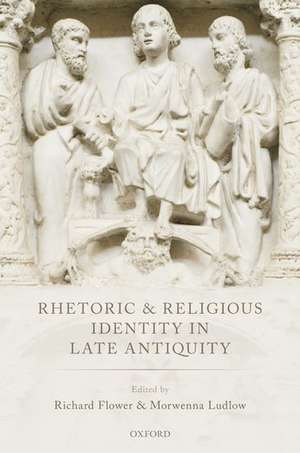Rhetoric and Religious Identity in Late Antiquity
Editat de Richard Flower, Morwenna Ludlowen Limba Engleză Hardback – 31 aug 2020
Preț: 594.07 lei
Preț vechi: 791.63 lei
-25% Nou
Puncte Express: 891
Preț estimativ în valută:
113.69€ • 118.26$ • 93.86£
113.69€ • 118.26$ • 93.86£
Carte tipărită la comandă
Livrare economică 03-09 aprilie
Preluare comenzi: 021 569.72.76
Specificații
ISBN-13: 9780198813194
ISBN-10: 0198813198
Pagini: 300
Dimensiuni: 162 x 241 x 22 mm
Greutate: 0.6 kg
Editura: OUP OXFORD
Colecția OUP Oxford
Locul publicării:Oxford, United Kingdom
ISBN-10: 0198813198
Pagini: 300
Dimensiuni: 162 x 241 x 22 mm
Greutate: 0.6 kg
Editura: OUP OXFORD
Colecția OUP Oxford
Locul publicării:Oxford, United Kingdom
Recenzii
The strongest essays of this collection are those that work with a clear set of definitions and methods. Part One is by far the most useful section of the book and will repay the attention of readers since issues of identity and rhetoric are at the forefront.
rhetoric and Religious Identity in Late Antiquity instructs with rich insights, delights with its wide array of subjects, and ultimately proves persuasive of its core argument about rhetorical representation among late antique religions.
In many cases, the essays break down dichotomies and remind us to be careful when trying to fit people or texts into particular categories of religious identity. The editors' goal was to study rhetoric in order to better understand religious identity and vice-versa, and the volume succeeds on both counts.
This volume will be essential reading for scholars concerned with East-West cultural interactions.
The volume,...successfully accomplishes what the editors promised in the first chapter and delivers a collection of contributions replete with rich sources and insightful approaches to understand how rhetoric and religious identities interacted.
rhetoric and Religious Identity in Late Antiquity instructs with rich insights, delights with its wide array of subjects, and ultimately proves persuasive of its core argument about rhetorical representation among late antique religions.
In many cases, the essays break down dichotomies and remind us to be careful when trying to fit people or texts into particular categories of religious identity. The editors' goal was to study rhetoric in order to better understand religious identity and vice-versa, and the volume succeeds on both counts.
This volume will be essential reading for scholars concerned with East-West cultural interactions.
The volume,...successfully accomplishes what the editors promised in the first chapter and delivers a collection of contributions replete with rich sources and insightful approaches to understand how rhetoric and religious identities interacted.
Notă biografică
Prof Richard Flower studied for his BA, MPhil and PhD in Classics at Clare College, Cambridge, and has worked at the Universities of Cambridge, Sheffield and Exeter. He specialises in the construction of imperial and ecclesiastical authority, particularly in late-antique polemical literature and heresiology. His publications include Emperors and Bishops in Late Roman Invective (Cambridge, 2013) and Imperial Invectives against Constantius II (Liverpool, 2016), and he is also editing The Cambridge Companion to Christian Heresy. Prof Morwenna Ludlow studied Classics and then Theology at the University of Oxford. She has written widely on Gregory of Nyssa. Her latest book, Art, Craft and Theology in Fourth Century Greek Authors (also published by OUP) examines the use of literary and rhetorical tropes by Christian authors and argues that they interpret themselves as both theologians and craftsmen with words.
